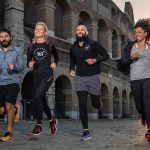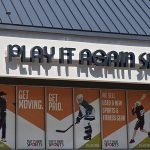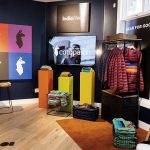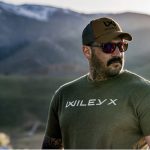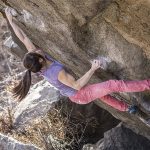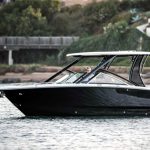Allan Fletcher founded Fletcher Leisure Group in 1966, becoming both a licensee and distributor of the games biggest names throughout Canada for over 40 years.
Including brands like FootJoy and MacGregor, FLG also was responsible for the Ashworth brand in Canada for the last 12 years.
With Fletcher moving into his new role with Ashworth 4 months ago, his son Mark took the reins at FLG.
TGR: How have the first four months on the job been?
AF: I continue to tell everybody, I took on this responsibility and this challenge, because I thought I could bring something to the company and support Eddie Fadel, our president, and the rest of our management team. My initial commitment here was a major one, but it wasnt 100% full-time. However, I really have found myself totally immersed here, having spent most of my time in the last four months in Southern California or traveling on behalf of Ashworth, attending golf shows or sales meetings or what have you. For someone my age, it is a new experience, but thankfully I have a supporting wife and family to be there and pick up the pieces in Canada so that I dont have to worry.
AF: To turn something around as quickly as everybody would like just doesnt happen. But the brand equity, the brand awareness, the whole cache of Ashworth and Callaway and the SunIce aspect, too, have been very encouraging. I think from our customers point of view, theyre recognizing that theres a solid golf management group in the company right now. The direction of the product gets better every day and were on the right track to make our brand into the most sought after, number one golf brand. Is that going to happen tomorrow? No, but certainly were on the right track. Were making all the right decisions from where I sit and guide.
TGR: Is there a worry of alienating your customer base by trying too hard to turn things around with product that doesn't fit the brand identity?
AF: Obviously, the golf channel has a taste level and a demand level for product that can vary from region to region; but, at the end of the day, what works in the eastern U.S. will have a similar level of success in California. We just have to find that balance that makes sense and go with it. We need to recognize also that our core competency is golf. Even in our international presence with our subsidiary in the UK and in Canada and our licensees around the world, we need to recognize that Ashworth is the global brand for golf apparel and weve got to make sure that were bringing to market product that makes sense for that channel. At the same time, the retailer has a taste level and product demands that may need a bit of tweaking. Theyre into some of the new eco-fabrics that are generating a bigger buzz and its important to make sure that we recognize their desires and are building products for that. The corporate world, they need to have a much narrower, deeper offering, so that when someone comes along and says we want 25,000 Ashworth shirts and we want to put X-Y-Z on it, that were in a position to service that business. So thats really where were coming from on channel-specific product.
AF: We had a major launch in the overall image of the brand. The product line, were out booking for fall and were encouraged with our business for fall. It also set the table for us to springboard forward with our account base to have them recognize that this is a golf management group that is managing the brand now; theyre committed to it, theyre in the face of the customers.
Prior to Christmas, I wrote a letter to about 10,000 customers in America, welcoming them to Ashworth, talking a little bit about who I was, and how important a relationship with them is. We got fantastic feedback on that simply because we had reached out and talked to them.
Ashworth has a great level of resilience, because if it didnt, it wouldnt be here today. People like it, they want this company to succeed. We have very good relationships with many tournaments across the country. When you go in and make an Ashworth presentation, they recognize the value and they recognize the importance of having a co-branded situation for their event or whatever is happening. So the PGA show set the table for us to be moving forward. It also was a great boost to the confidence level of our sales team to understand how were moving forward.
AF: Certainly, I would be naïve if I didnt think the retail sector is under a bit of pressure from that. But we have rationalized our retail focus so that we are selling to the retail customer base that we think is good for our brand and also is committed to growing a long-term, profitable relationship. The retail channel can be a real challenge at times and if things head south, they come back to the vendor base for help. We dont have the luxury of doing business that way. We have to build alliances with good people out there that make sense. Retail is an important business, but golf is our real core aspect that we are focused on. However, as any brand becomes stronger, it becomes demanded too. As you build your core competency back up in golf, and become in greater demand, the market looks at you in a different.
AF: Generally, the golf channel of green grass clubs and off course specialty stores, has had a little bit of insulation. Interestingly enough when there is a downturn theres a bit of pressure on memberships and a bit of pressure on green fees paid, there also seems to be a higher populace who are out there playing, because they are in between jobs or the stress levels a little easier on the golf course than in the office watching the ticker. So you seem to win a little by default even now.
AF: The first quarter, especially a November, December, January quarter, thats really at the lowest ebb of the topline sales and at the same time you end up with a lot of SG&A in there and you get some carryover from the year before. But, we are working extremely hard on our SG&A situation and again, you really solve a lot of issues in any business if your topline growth performs, because it trickles right on down. We have our infrastructure here to grow our business very successfully over the next few years and thats what our main focus is. Were going to bring to market the best product we can and were going to make ourselves a strong brand.

